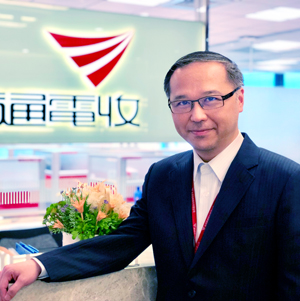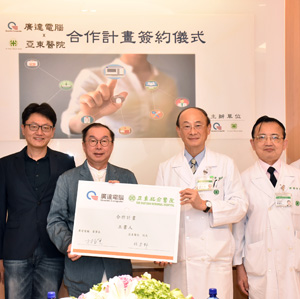07.2019 Cover Story
Fu Ming Transport Started Smart Logistics to Capture the New Retail Market
Far Eastern Magazine / Editorial Room

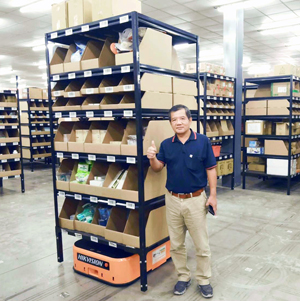

Amazon, the world's leading e-commerce company, has been improving its ordering, picking and packaging processes for more than 20 years, so it has dominated the retail market with faster and better logistics, such as the well-known UAV delivery, Kiva automated robot picking, and the recent Amazon Key trunk delivery and Amazon FBA services. These all are innovations in the industry, and also highlight the importance of logistics to retail business. After years of planning, Fu Ming Transport (FMT) officially opened its international logistic center in Taichung City in this January. Behind the innovation and transformation, there are challenges and visions. General Manager, Xu Wande and Manager Su Shijie, who is in charge of logistic business, were invited to talk about how FMT built up a smart logistic platform in the new retail era in this issue.
Launch the First Shot of Logistics with Pharmaceutical Warehouse
With the popularity of new retail concepts of virtual, physical and cross-border integration, many dealers actively rush into the logistics market. Symphox, owned by Cathay Pacific Linyuan Group, invested NT$30 billion in Ally Logistic Property in 2014 to build 1,155,000 square meters of logistic warehousing in Taiwan. MOMO, an e-commerce business, also accelerates the short-chain logistics deployment this year. The satellite warehouse will be increased to 20 this year and 30 next year. In order to help the FEG build a complete retail layout, FMT, with more than 40 years of transportation experience, has quietly launched the transformation in recent years.

Despite the fierce and urgent battle of logistics, President, Xu Wande insisted on steady fighting. "After all, logistics is a complex industry with poor gross profit and is a new field for us. In addition to establishing more innovative practices and management to enhance profits, we also hope that we can solidly accumulate basic skills without affecting the operation and profitability of the core business as the prerequisite."
Although the total investment of FMT is not significant compared with other tens of billions of dollars in investment, to rapidly enhance its combat power and establish differentiation, FMT has initially focused on medicine, air conditioning and food warehouses with high-specification. "At present, one of the main customers of Taichung City Phase I warehouse is the top three pharmaceutical business," said Manager Su, Shijie, who led the logistics project. In addition to storing goods, we also provide logistic operations and distribution services of more than 108 pharmaceutical stores, although it is a to-B (to-Business) model, it contains a concept similar to “to C (to Customer) model”, because commodity items are very diverse, almost 2,000 items need to be distributed every day, and the size is different. It is very difficult for inventory control, picking or distribution. In addition, the expensive items also make the team feel pressure. "The value of inventory is as high as $300 to $400 million. The responsibility of security is very important. Every day's inventory and the accounts must be reconciliated. Therefore, the control of receiving and delivering is critical. On the other hand, attention must be paid to expiration date management of medical logistics to help customers reduce inventory losses, so goods must be "first in first out" to avoid the excessively long time for the inventory in the warehouses, which undoubtedly increases the difficulty of implementation. "
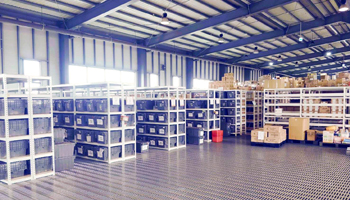
Taichung City Warehouse Phase I is a "small but refined" warehouse, although it covers only 3,300 square meters. Manager Su said, "We use pillarless design, so it is very easy to use the space, and with dense storage method, only 1,650 square meters of space are used to store pharmaceutical goods which originally occupy 9,900 square meters of warehouse space, and then AGV transporting robots are used to bring the goods to the picking staffs to improve the picking efficiency in the way of "delivering goods to people". This method is highly automated and naturally has many interconnected systems. From the control system of the underlying equipment to the warehouse management system, ERP, and even POS system, data exchange would be carried out at any time, which makes the initial operation more challenging. Not only that, unlike general warehousing equipment and systems, which are purchased from Chinese manufacturers, FMT only purchased equipment from Chinese manufacturers, and then cooperated with Taiwan's IT operators to develop a "Human-machine interface" system. Manager Su further explained that "on the one hand, it is more consistent in phraseology, on the other hand, it considers the flexibility of future adjustments, but because the original program has been modified. It takes more effort to connect."
Challenges and running-in test the team's fighting spirit. Even President Xu, who has always given the image of a tough guy, can't help sighing, "Operating Taichung City Warehouse is the most painful and challenging period in his career so far!" "Especially during the rainy season in May, a heavy rain caused a power outage in the warehouse and made President Xu very worried. Although we planned the UPS in advance, the power failure still caused the system crash, and because it was uncertain whether all the robotic equipment had received instructions, the system needed to be reset and information need to be filtered. However, this was also good experience. Next time when we encounter a similar situation, our colleagues will be able to handle it more efficiently”. Fortunately, thanks to the joint efforts of all, the first phase of Taichung City warehouse is gradually on track, and the improvement of efficiency is reflected in personnel costs. "The cost of dispatching personnel in April has been reduced by 60% compared with the initial stage. In the future, we plan to increase the number of AGV robots, and even build the second phase of "self-service warehouse" to reduce personnel costs to even lower level. "
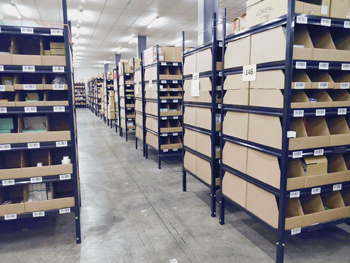
Building High Competitive Threshold and capturing International Logistics Business Opportunities
To increase the efficiency of space, Manager Su divides the first-stage warehouse into two parts, half of which is medical logistics, and builds two interlayers to reduce the space of each layer so as to adjust the temperature conveniently; the other half uses heavy material racks to place offshore wind power raw materials and equipment, biotechnology products, bulk materials and other goods. At present, phase I warehouse is almost full. In order to achieve economic scale, the phase II warehouse next to it is also under construction.
The second phase of the warehouse, which is expected to be opened in Q3 to Q4 next year, is a hybrid warehouse. It also uses dense storage method, providing up to 9,900 square meters space with 28 meters in height. Manager Su emphasized that "the phase II warehouse is an integrated warehouse of racks and warehouse". The direct use of material racks as warehouse structure can not only save construction and labor costs and construction time, but also increase the warehouse position of pallets and enhance the strength and seismic resistance due to the absence of the influence of structural beams and columns. In order to speed up shipment, goods can be received from the wharf of the first warehouse, and then shipped out from the second warehouse, FMT has built additional automatic conveying equipment to link the first and second warehouses. "After integration, I believe that it must be the most advanced logistics warehouse in Taiwan”. Manager Su is confident in the development of warehousing and logistics business.
This confidence is reasonable. Taichung City Phase I and Phase II warehouses have been approved to be listed as international logistics centers, which can store bonded and non-bonded goods in a mixed way and can perform simple processing. Therefore, port-based processing of exporters and value-added services of re-export trade have become the target customers of FMT. "International logistics centers have great advantages in tax, rapid customs clearance and exemption from inspection of goods. Even the equipment used has tariff-free preferences, which can greatly reduce investment costs," said Manager Su. "
International logistics centers are flexible in dealing with goods and can be managed independently by the operators without the need for long-term Customs stationing, but in contrast, information security of the systems, field management and other links, have to pass strict audits. At present, there are only about 20 qualified international logistics centers in Taiwan. FMT will continue to carry out the verification of ISO 9001, 14001 and other related certifications to strengthen quality control.
In response to the upsurge in returning of Taiwan business from China, President Xu foresees that Taichung City and Taipei will become the strongholds with great potential for development at that time, so the Taipei warehouse of the third phase of FMT will be located in Taipei Port, which is expected to have a space of 46,200 square meters. At that time, he will also apply for part of the space to become a free trade port area in order to make full use of the advantages of free trade port area and international logistics center to expand the service content. "for example, assisting in handling packaging of simple processing and assembly; or carrying out inspection, quarantine and labeling for imported commodities; in the future, it will not exclude leasing to manufacturers to operate in the mode of "warehouses behind stores "or "factories behind stores".
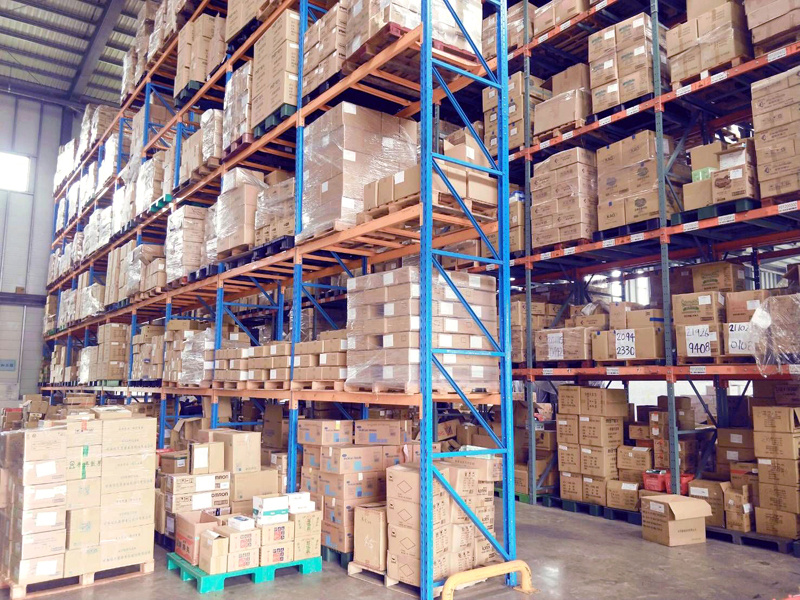
Optimizing Technology Applications to Assist Group to Move Toward New Retail
In addition to the foreseeable huge business opportunities, Manager Su knows that the application of new technology can make intelligent logistics be full of possibility. "We have applied face recognition to warehouse access control, and it is expected to expand the use in goods distribution, signature and other situations in the future to collect more Big Data." Furthermore, the connection between self-service vehicles or equipment rooms has already formed the Internet of things (IoT) mode. With the joining of future fleet and the development of cold chain (Frozen/refrigerated supply chain), there will be more information exchange and the application of IoT (Internet of things (IoT). As for Big Data, it is also a subject that smart logistics must face, including: the planning of delivery fleet route optimization, warehouse efficiency optimization analysis, commodity warehousing optimization judgement, all of them need data calculations. "If we can further cooperate with Yuan Ze University, through data analysis, we can produce more useful information, and then give feedback to customers which can provide higher added value."
As President Xu said, "Logistics is more than mere delivery of goods. True intelligent logistics requires insight into the needs of the overall ecological chain”. Therefore, FMT will formally set up a logistics company in the near future to build its IT team. After the warehousing scale becomes more mature, it will further develop bonded truck fleet and cooperate with vendors, retailers and other channels to reduce the cost of information exchange and improve the logistics process. "For the longer term, we hope to cooperate with Far Eastern International Bank, Far EasTone Telecommunication, Department Stores and Retail and other affiliated business to integrate the cash flow, information flow, business flow and logistics within the Group and complete the construction of supply chain platform."
In the new economic era, keeping transformation and upgrading is the way for business to survive. FMT, starting from transportation, has stepped out of the first step of the Group's logistics integration. It is also hoped to help the Group complete the last mile of new retail business and truly realize its vision of "in the midst of strategy, winning thousands of miles".


